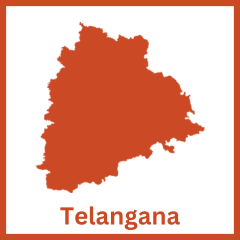The state of Telangana has seen impressive economic growth under the leadership of Chief Minister K Chandrashekar Rao and his Bharat Rashtra Samithi (BRS) party over the past decade. With the state assembly elections coming up on November 30th, the economic report card could influence voter decisions.
Growing Economy of Telangana

![]()
![]() When Telangana was formed in 2014 after years of activism and agitation, economic progress for the underdeveloped region was a key demand. The expectation was that a separate state would allow focused governance and better utilization of resources. The data shows that Telangana has delivered on that promise, with growth consistently surpassing national averages.
When Telangana was formed in 2014 after years of activism and agitation, economic progress for the underdeveloped region was a key demand. The expectation was that a separate state would allow focused governance and better utilization of resources. The data shows that Telangana has delivered on that promise, with growth consistently surpassing national averages.
Telangana’s Gross State Domestic Product (GSDP) grew by 155.7% from 2014-15 to 2022-23, compared to 118.2% for India’s GDP in the same period. The state’s share of the national GDP increased from 4.1% to 4.8% despite its population share remaining stable at 2.9%. Clearly, the economic pie has expanded faster in Telangana.
Rising Incomes and Standard of Living
 This rapid economic expansion has translated into rising incomes and standards of living for the state’s citizens. In 2014, the average per capita income in Telangana was ₹1.12 lakhs compared to ₹79,118 pan-India. By 2022-23, the average citizen earned ₹3.08 lakhs against the national average of ₹1.72 lakhs.
This rapid economic expansion has translated into rising incomes and standards of living for the state’s citizens. In 2014, the average per capita income in Telangana was ₹1.12 lakhs compared to ₹79,118 pan-India. By 2022-23, the average citizen earned ₹3.08 lakhs against the national average of ₹1.72 lakhs.
Higher incomes reflect in metrics like vehicle ownership and power consumption. So the “feel good” factor is tangible for many households.
Concerns Around Fiscal Deficit
However, there are concerns around fiscal discipline. The state’s fiscal deficit for 2023-24 is projected at 2.7% of GSDP, lower than the permitted 3.5% but still substantial.
Outstanding liabilities or accumulated debt also continues to rise, expected to touch 23.8% of GSDP by next year. The state has taken on higher interest costs and repayment obligations to fund its spending and development projects.
Have Living Standards Really Improved for All?
While the macro growth story is clearly positive, it remains to be seen whether these gains have percolated down to the poorest segments. Have struggling farmers and job seekers also benefited?
The BRS government can rightfully claim credit for tangible improvements in electricity access, irrigation infrastructure, urban transportation and more. Schemes like Mission Kakatiya (river restoration) and Rythu Bandhu (direct farmer support) have provided relief.
‘Kaam Ki Rajneeti’ Faces Acid Test
 CM KCR is seeking re-election based on a “politics of development” pitch, showcasing Telangana’s industry leadership and state welfare schemes. The economic report card is central to that messaging.
CM KCR is seeking re-election based on a “politics of development” pitch, showcasing Telangana’s industry leadership and state welfare schemes. The economic report card is central to that messaging.
With a resurgent opposition also in the fray, the coming elections will test whether Telangana’s voters agree that material progress has touched their lives. Has KCR’s model of governance delivered ‘sabka vikas’ (progress for all) or only enriched the politically well-connected? The electorate’s verdict will provide the answers.












